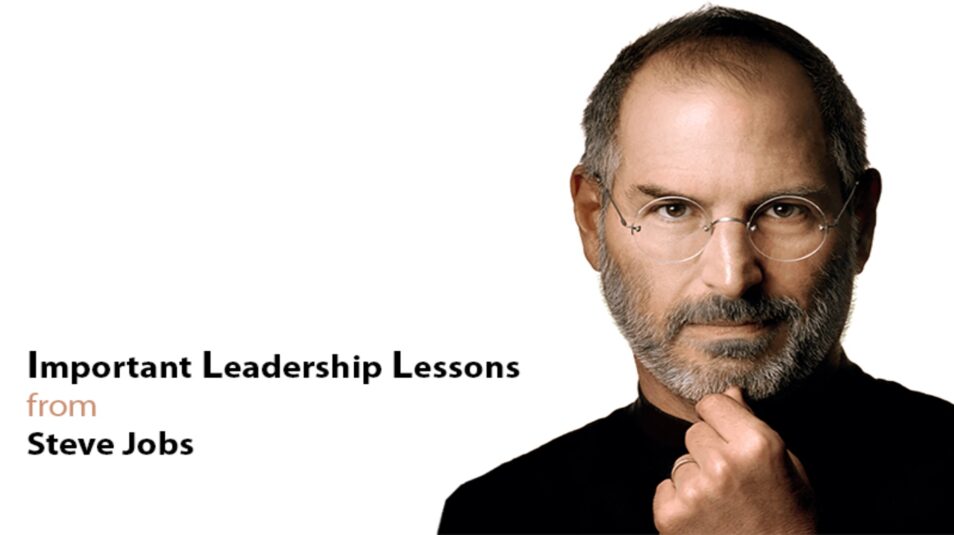Important Leadership Lessons from Steve Jobs

Leadership
April 12, 2021
Louis Carter
Executive coach, best-selling author, and strategic advisor to Fortune 500 organizations
Topics
creativity, Employee Motivation, encouraging, Innovation, Leadership, leadership lessons, Steve Jobs, VisionSteve Jobs had a profound impact on the computer, television, music, telecom, and publishing sectors. Successful leaders are always prepared for unforeseen challenges and can fix them. And yet, at the end of the day, they know what truly matters—their people skills and ability to innovate. These are much more critical for leaders than rigid procedures or ideals. Steve Jobs embodied this.
Apple is an industry-defining entrepreneurial achievement championed by Jobs and his inspirational leadership style. His artistic vision, his "attention to detail," was undeniably critical to Apple's growth. Apple's versatility – a brainchild of Jobs and his creative flair –is what set it apart in a world of fast-growing technology firms.
Steve Jobs was not only renowned for his creative prowess. He was also a people person, a thorough professional, and a truly in love thinker with his work. He was a visionary leader who continues to inspire future generations of entrepreneurs even after his death.
1. Have a Vision
A primary reason for Apple's success is that Jobs had a clear vision of where he wanted to take the company. This vision was shared across the organization so that everyone knew how Jobs envisioned Apple in the future. The company's leaders still use Apple's vision to inspire and motivate employees to innovate and perform their best.
2. Empower Your Employees
Have you ever been told to be decisive and authoritative in your approach? Steve Jobs did not believe in that. Authoritative or autocratic leaders feel they have all the answers, and employees are expected to accept their decisions. Additionally, they expect subordinates or followers to obey rules without questioning.
Steve Jobs was nothing like this. Instead, he would treat his subordinates as equals and would always be open to suggestions from them. He empowered all his employees and allowed them to cut through red tape to fulfill their true potential, benefiting Apple in the process.
3. Challenge Your Employees
Leaders are responsible for encouraging employees to set goals for themselves and be more innovative and productive. Jobs adopted this approach, which enabled his employees to challenge themselves and fulfill their true potential.
4. Take Responsibility
Leaders take charge of everything. They go above and beyond what they are required to do. They do this not because they want recognition or praise but because they believe it is the right thing. Jobs had this approach. He double-checked every aspect of every activity that required his oversight or leadership. He never depended on people to get things done. If there were something he could do himself, he would do it without any fuss.
5. Keep the Creative and Critics Apart
Steve Jobs saw critical analysis, explication, and imagination are critical components of the creation process. However, he also believed that these components should be kept separate till the end. If critics and creatives are brought together into the same room, the critics would only enrage the creatives, hindering their ability to innovate.
However, creatives can easily miss the mark and struggle to achieve organizational goals if they don't get objective input from critics. Both are required, but they must be kept apart throughout the creative process. It would be best to build diverse spaces for sub-teams to prosper without being inhibited by others for creativity to flourish.
6. Aim for Perfection
Steve Jobs was unyielding in his quest for perfection. Jobs got the headphone jacks wholly replaced before the introduction of the iPod. Jobs' model of perfection strongly indicates that he did not accept anything less than the best. He aimed for perfection and expected the same from his employees.
Final Word
Steve Jobs and his desire to foster an innovative culture within the organization helped Apple reach the heights that it did. Jobs had an out-of-the-box approach to leadership and reflected in everything that he did. The life of Steve Jobs should serve as a blueprint for corporate leaders who want to excel in their roles and help their companies aim for the moon.






